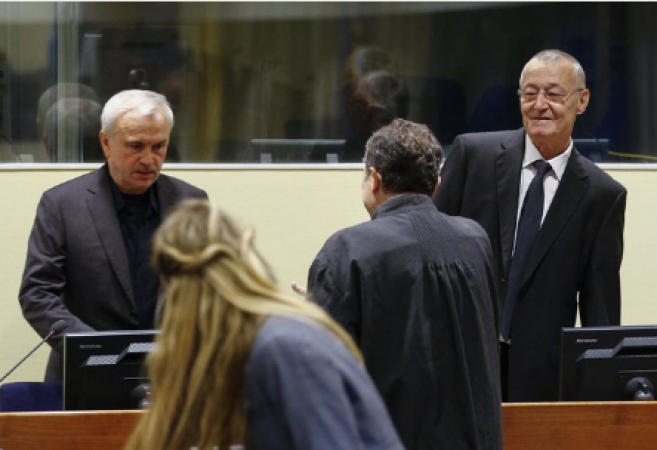
The Hague: In the final significant Hague war crimes trial from the 1990s Bosnian conflict, a UN court Wednesday increased the prison terms for two former Serbian spy chiefs.
Jovica Stanisic, the head of the state security service under the late Serbian president Slobodan Milosevic, and Franko Simatovic, his deputy, attempted to overturn their convictions in 2021, but judges rejected their appeals and increased their original sentences from 12 to 15 years in prison.
The court overturned Stanisic and Simatovic's initial acquittal on that charge and determined that they had participated in a criminal plot to "ethnically cleanse" non-Serbs from significant portions of Bosnia and Croatia.
Also Read: Hasina says her visit to the US marked an important milestone
The verdict was hailed by the prosecution as important because it for the first time directly connected Serbia's Milosevic, who passed away in custody at The Hague in 2006, and his regime's atrocities in Bosnia.
Serge Brammertz, the chief prosecutor, told reporters outside of court, "It's really important. "It's the only choice we have that directly involves Belgrade officials who were found guilty of participating in a joint criminal enterprise."
The verdict could help reduce the tensions that still afflict the Balkans, according to Munira Subasic, president of one of the "Mothers of Srebrenica" associations that fights for justice for the massacre victims from 1995.
Also Read: Russia cannot block Ukraine's membership in the military alliance, according to NATO's Stoltenberg
"Truth is necessary for justice to exist. There is no trust if there is no justice. And there can be no reconciliation without trust," Subasic told the media.
The only person present for the verdict was Stanisic, who was dressed in a blue jacket and a wide-collared white shirt while occasionally wringing his hands. Simatovic observed from his cell using a videolink.
The court upheld the pair's convictions for murder as a war crime as well as murder, persecution, forcible transfer, and deportation as crimes against humanity.
In April 1992, a Serb death squad terrorised the Bosnian town of Bosanski Samac with murders, rapes, and looting, according to the report.
However, judges also found them guilty of participating in a larger plot to commit more serious crimes throughout the Balkans as well as being accountable for a murder that occurred in Croatia in June 1992.
Head appeals judge Graciela Gatti Santana declared, "The appeals chamber dismisses Stanisic's and Simatovic's appeals in their entirety... and imposes a sentence of 15 years" on each.
Simatovic and Stanisic both shared the desire to further the common criminal objective of evicting most non-Serbs from significant portions of Bosnia and Herzegovina and Croatia forcibly and permanently.
The judge also stated that Simatovic had served just over eight years and Stanisic had already served seven years. Although the Hague tribunal has previously given life sentences to suspects like military commander Ratko Mladic and Bosnian Serb political leader Radovan Karadzic, it has been more difficult to connect crimes to Serbia itself.
The verdict on Wednesday, according to prosecutor Brammertz, demonstrated that "political leadership from neighbouring countries, here in particular from Belgrade, were involved in the planning of those large ethnic cleansing campaigns."
The UN tribunal's longest-running and final case involving crimes from the wars that tore apart Yugoslavia after communism fell is the Stanisic and Simatovic case, which has been ongoing for 20 years.
The two were detained in 2003 and found not guilty in a preliminary hearing in 2013, but the court mandated a retrial. This announcement represents a turning point in the history of the mechanism... The final appeal judgement is announced by the appeals chamber, according to Gatti Santana. The International Criminal Tribunal for the former Yugoslavia (ICTY) has transferred cases to the court, formally known as the International Residual Mechanism for Criminal Tribunals (MICT).
Also Read: An ex-member of the Australian SAS who sued over news of executions in Afghanistan was unsuccessful
In 2017, the ICTY was abolished. About 130,000 people died and millions were displaced as a result of the Balkan wars. Conflicts broke out on Monday between ethnic Serbs and NATO-led peacekeepers in northern Kosovo, adding to the region's simmering tensions.